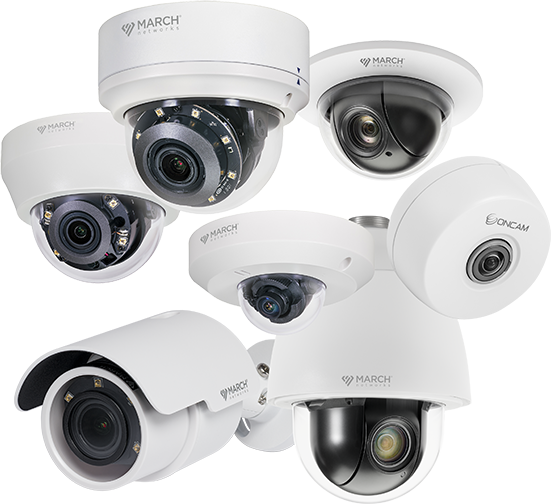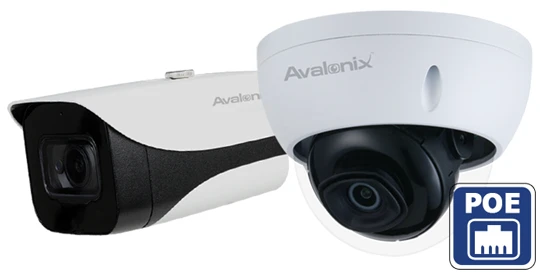IP cameras, also known as Internet Protocol cameras, are digital video cameras that transmit data over a network. These cameras connect to the internet for remote monitoring and recording.
They offer high-quality video footage and advanced features like motion detection and cloud storage. IP cameras play a crucial role in modern security systems, providing users with round-the-clock surveillance and peace of mind. With their easy installation and integration with smart devices, IP cameras are becoming increasingly popular in homes, businesses, and public spaces.
Whether you need to monitor your property or keep an eye on your loved ones, IP cameras offer a versatile and reliable solution for all your security needs.

Credit: www.marchnetworks.com
How Ip Cameras Work
An IP camera, also known as internet protocol camera, is a type of digital video camera that enables you to monitor and record video footage over an internet network. Unlike traditional analog cameras, IP cameras use the power of the internet to transmit data, making them more versatile and accessible. Wondering how IP cameras actually work? Let’s explore the basic principles and network connectivity involved.
Basic Principles
The basic principle behind IP cameras is the conversion of video and audio data into digital signals, which can then be transmitted over a computer network. These cameras have built-in processors that compress and encode the data into packets, allowing for efficient transmission.
Here’s a breakdown of how IP cameras work in simple steps:
- Image Capture: IP cameras capture video and audio using specialized image sensors, typically a charge-coupled device (CCD) or a complementary metal-oxide-semiconductor (CMOS) sensor. These sensors convert light into electronic signals, which are then processed into a digital format.
- Digital Encoding: The captured video and audio signals are encoded into a digital format such as H.264 or MPEG, using compression algorithms. This encoding reduces the file size while maintaining the quality of the footage.
- Data Transmission: The encoded digital data is divided into packets for efficient transmission over a computer network. These packets are sent via Ethernet cables, Wi-Fi, or other network connections to a designated receiver or recording device.
- Decoding and Playback: At the receiving end, the recorded packets are decoded and reassembled into a digital video and audio stream. Users can then access the footage on their computers, smartphones, or any other internet-enabled device.
Network Connectivity
One of the key advantages of IP cameras is their network connectivity, which allows remote access and control over the footage. These cameras can be connected to a local area network (LAN), a wide area network (WAN), or even the internet, providing flexibility and convenience for monitoring and managing security.
Here are the different network connectivity options for IP cameras:
- Wired Connection: IP cameras can be connected through Ethernet cables, providing a stable and reliable connection. This is ideal for situations where the cameras are located in close proximity to the network switch or recorder.
- Wireless Connection: Wi-Fi-enabled IP cameras eliminate the need for physical cables and allow for flexible installation. These cameras connect to the network wirelessly, providing mobility and adaptability in positioning.
- Internet Connection: With an internet connection, IP cameras can be accessed and controlled remotely from anywhere in the world. This enables users to monitor their property or business premises through a secure online platform or smartphone application.
By leveraging network connectivity, IP cameras offer unparalleled convenience, scalability, and accessibility. Whether for home security or business surveillance, these cameras provide a modern and efficient solution.

Credit: www.arcdyn.com
Benefits Of Ip Cameras
IP cameras offer multiple benefits that make them a preferred choice for security and surveillance. From high-quality video to remote access and scalability, these cameras provide advanced features that enhance safety and monitoring capabilities.
High-quality Video
IP cameras are known for their ability to capture high-resolution video, ensuring crystal clear footage. This high-quality video enables accurate surveillance and better identification of individuals or objects. With sharp and detailed images, IP cameras provide enhanced security and facilitate effective monitoring of properties and assets.
Remote Access
With IP cameras, users can access live video feeds from anywhere using an internet-enabled device. This remote accessibility allows for real-time monitoring and instant alerts, empowering users to respond to security incidents promptly. Whether it’s checking in on a property or ensuring business operations are running smoothly, remote access offered by IP cameras ensures peace of mind and convenience.
Scalability
IP camera systems are highly scalable, allowing for easy expansion and integration with additional cameras or devices. This scalability makes IP cameras suitable for various environments, from small businesses to large-scale facilities. With the ability to adapt to changing surveillance needs, IP cameras provide flexibility and long-term cost-effectiveness for expanding security requirements.
Types Of Ip Cameras
IP cameras come in various types to suit different surveillance needs. Below are the popular types of IP cameras:
Fixed Ip Cameras
A fixed IP camera captures video in a fixed position without the ability to pan, tilt, or zoom.
Ptz Ip Cameras
PTZ IP cameras allow users to remotely control the camera’s pan, tilt, and zoom functions for a wider coverage area.
Wireless Ip Cameras
Wireless IP cameras connect to the network wirelessly, offering flexibility in installation and placement.
Factors To Consider When Choosing An Ip Camera
When selecting an IP camera, it’s crucial to consider factors such as resolution, field of view, night vision capabilities, and connectivity options. These cameras offer high-quality video surveillance for homes and businesses, making it essential to choose the right features for your specific needs.
factors to consider include resolution, field of view, and low-light performance.Resolution
< p> High resolution IP cameras provide clear, detailed images for enhanced security monitoring.Field Of View
< p> Wider field of view allows for monitoring larger areas with a single camera.Low-light Performance
< p> Good low-light performance ensures visibility even in dimly lit environments.
Credit: www.cctvcameraworld.com
Conclusion
IP cameras offer advanced surveillance solutions for homes and businesses. With their high-resolution imaging, remote monitoring, and easy integration, they enhance security measures. The versatility and flexibility of IP cameras make them a valuable asset in the modern world. By adopting IP cameras, one can protect their properties and loved ones effectively.


0 comments